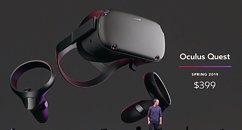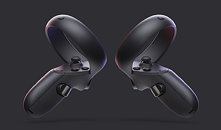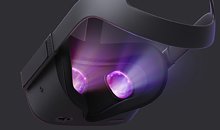Standalones headsets are the new flavor of the VR town this side of 2018. They bring a sorely needed dimension to this segment, allowing users to enjoy some VR experiences that are near what the Oculus Rift or HTC Vive offer, but with a much more palatable price and format. The ability to not be tethered also means being able to experience room-scale VR without having your lizard brain worry about tripping on cables either. This brings us to the Oculus Quest that was launched this week at the Oculus Connect 5 developer conference, just a couple of years after the debut of Project Santa Cruz that has finally culminated in a retail product.
The new wireless, standalone headset goes beyond what Oculus Go went to when announced earlier this year. Based on the Qualcomm Snapdragon 835 (Oculus Go was based on a Snapdragon 821) and offering 64 GB of integrated storage, the Oculus Quest offers 1600x1440 resolution per eye and has full six degrees of freedom (6DOF) support versus the three degrees on the Oculus Go. The headset will be available in spring of next year for $399, and more details can be seen past the break.



The Oculus Go launched with the same idea, but this $199 headset was more akin to what a VR accessory for smartphones offered already. The new Oculus Quest is more ambitious and, besides avoiding the need for a smartphone or a PC, it includes touch motion controllers which will allow more of the Oculus Rift-like experiences and games to be supported on this new headset. Those Rift games won't be playable out of the box, but developers will have tools to port those titles easily. It is no secret that the majority of VR experiences today have not exactly been very demanding in graphical fidelity owing to the niche market, and developers wanting to make them accessible to as many people as possible- something that means catering to those with mainstream GPUs. As it stands, over 50 games will be available at launch according to Oculus, although we do not yet know how many of these are also PC VR titles.
In their official blog post, the company explains how they have included a new system that "uses four ultra wide-angle sensors and computer vision algorithms to track your exact position in real time without any external sensors." They went on to say that insight "gives you a greater sense of immersion, presence, and mobility, plus the ability to go beyond room-scale". Marketing talk no doubt, but this is still promising and exciting nonetheless- especially when John Carmack goes on to say that the headset is "in the neighbourhood of power of an Xbox 360 or PS3".
This announcement confirms the company's interest in the standalone devices market. Given the slow adoption of traditional tethered PC VR headsets such as the Rift and its competitor, HTC's Vive, trying to overcome their limitations while giving a "good enough" experience could make sense. Wired VR headsets can be annoying to set up and use, and smartphone based headsets are a good entry point to those experiences, but not much more. With standalone headsets that bring motion controllers, users can potentially get the benefits from both worlds: this could mean people could jump to VR gaming and experiences in a faster, much more comfortable and convenient way. There are still more hurdles to cross, but at the $399 price point the Oculus Quest needs to impress from day 1 if it wants to be a game changer.
View at TechPowerUp Main Site
The new wireless, standalone headset goes beyond what Oculus Go went to when announced earlier this year. Based on the Qualcomm Snapdragon 835 (Oculus Go was based on a Snapdragon 821) and offering 64 GB of integrated storage, the Oculus Quest offers 1600x1440 resolution per eye and has full six degrees of freedom (6DOF) support versus the three degrees on the Oculus Go. The headset will be available in spring of next year for $399, and more details can be seen past the break.



The Oculus Go launched with the same idea, but this $199 headset was more akin to what a VR accessory for smartphones offered already. The new Oculus Quest is more ambitious and, besides avoiding the need for a smartphone or a PC, it includes touch motion controllers which will allow more of the Oculus Rift-like experiences and games to be supported on this new headset. Those Rift games won't be playable out of the box, but developers will have tools to port those titles easily. It is no secret that the majority of VR experiences today have not exactly been very demanding in graphical fidelity owing to the niche market, and developers wanting to make them accessible to as many people as possible- something that means catering to those with mainstream GPUs. As it stands, over 50 games will be available at launch according to Oculus, although we do not yet know how many of these are also PC VR titles.
In their official blog post, the company explains how they have included a new system that "uses four ultra wide-angle sensors and computer vision algorithms to track your exact position in real time without any external sensors." They went on to say that insight "gives you a greater sense of immersion, presence, and mobility, plus the ability to go beyond room-scale". Marketing talk no doubt, but this is still promising and exciting nonetheless- especially when John Carmack goes on to say that the headset is "in the neighbourhood of power of an Xbox 360 or PS3".
This announcement confirms the company's interest in the standalone devices market. Given the slow adoption of traditional tethered PC VR headsets such as the Rift and its competitor, HTC's Vive, trying to overcome their limitations while giving a "good enough" experience could make sense. Wired VR headsets can be annoying to set up and use, and smartphone based headsets are a good entry point to those experiences, but not much more. With standalone headsets that bring motion controllers, users can potentially get the benefits from both worlds: this could mean people could jump to VR gaming and experiences in a faster, much more comfortable and convenient way. There are still more hurdles to cross, but at the $399 price point the Oculus Quest needs to impress from day 1 if it wants to be a game changer.
View at TechPowerUp Main Site




 (competing with a Switch? well i wonder which user we will see fall of a bridge or in a lake
(competing with a Switch? well i wonder which user we will see fall of a bridge or in a lake  never say never ... don't underestimate the humans ... Pokemon GO did show us that
never say never ... don't underestimate the humans ... Pokemon GO did show us that  )
) ) so the Quest will be 459-518chf (i hope not
) so the Quest will be 459-518chf (i hope not 
